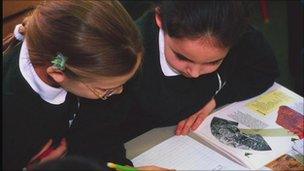National curriculum 'led to tick-box teaching'
- Published

The report said the curriculum had raised standards
England's "overloaded" national curriculum has led to a "tick list" approach to teaching and is in need of reform, a report says.
A study by Cambridge University's international exam group also says "overbearing assessment" has led to "narrow drilling for tests".
But it warns greater problems could be caused by revising it in the wrong way.
The government says any changes to the national curriculum will be based on international evidence.
The report by Tim Oates, head of assessment, research and development at Cambridge Assessment, concludes there are "significant structural problems" in the national curriculum "which need to be corrected".
He adds that changing what has to be taught in schools alone will not improve the education system.
Teaching quality, teacher expertise, learning materials and inspection also need improving, he says.
He argues that a well-defined and enhanced national curriculum based on concepts, principles and key knowledge can lead to a greater focus on deeper learning, with fewer topics being pursued to greater depth.
The report, however, does find that the national curriculum has been effective in raising standards, improving pupil progression and has led to higher expectations for young people.
Mr Oates also suggests it would be important to use international comparisons when reviewing the national curriculum, but he advises against importing any system in its entirety.
He highlights how the best performing countries education-wise have much smaller populations than England and very different demographic and social situations.
'Aims and values'
But overall, he says: "These perspectives help with a principled reduction of any unnecessary bulk in the national curriculum."
He describes the national curriculum as "an expression of content and of aims and values".
But he warns: "It cannot do everything. To expect it so to do will most likely result in failure."
Education Secretary Michael Gove has often championed Finland's national curriculum as a clear and concise indication of what children should be expected to learn.
And he is expected to push for a slimming down of the England's national curriculum in the forthcoming review of it.
International comparisons
In a foreword to the paper, he says he supports the call for international evidence to be at the heart of curriculum reform.
"This fascinating and insightful paper offers a concise analysis of some of the problems with our current national curriculum and helps explain why so many other nations are outpacing us in educational performance," he writes.
"The best-performing education nations deliberately set out to compare themselves against international benchmarks - learning from each other and constantly asking what is required to help all children do better.
"Shortly, my department will launch its own review of the national curriculum and the remit will explicitly, for the first time, require benchmarking against the most successful school systems.
"This - as Tim makes clear - has to be done with great care to avoid learning the wrong lessons from countries with very different cultures. But it is essential if we are to keep pace with the world's best."
A Department for Education spokeswoman said the benchmarking meant there would have to be supporting international evidence for any future reforms of the curriculum.
Mr Oates has been appointed an adviser to the government on curriculum reform.